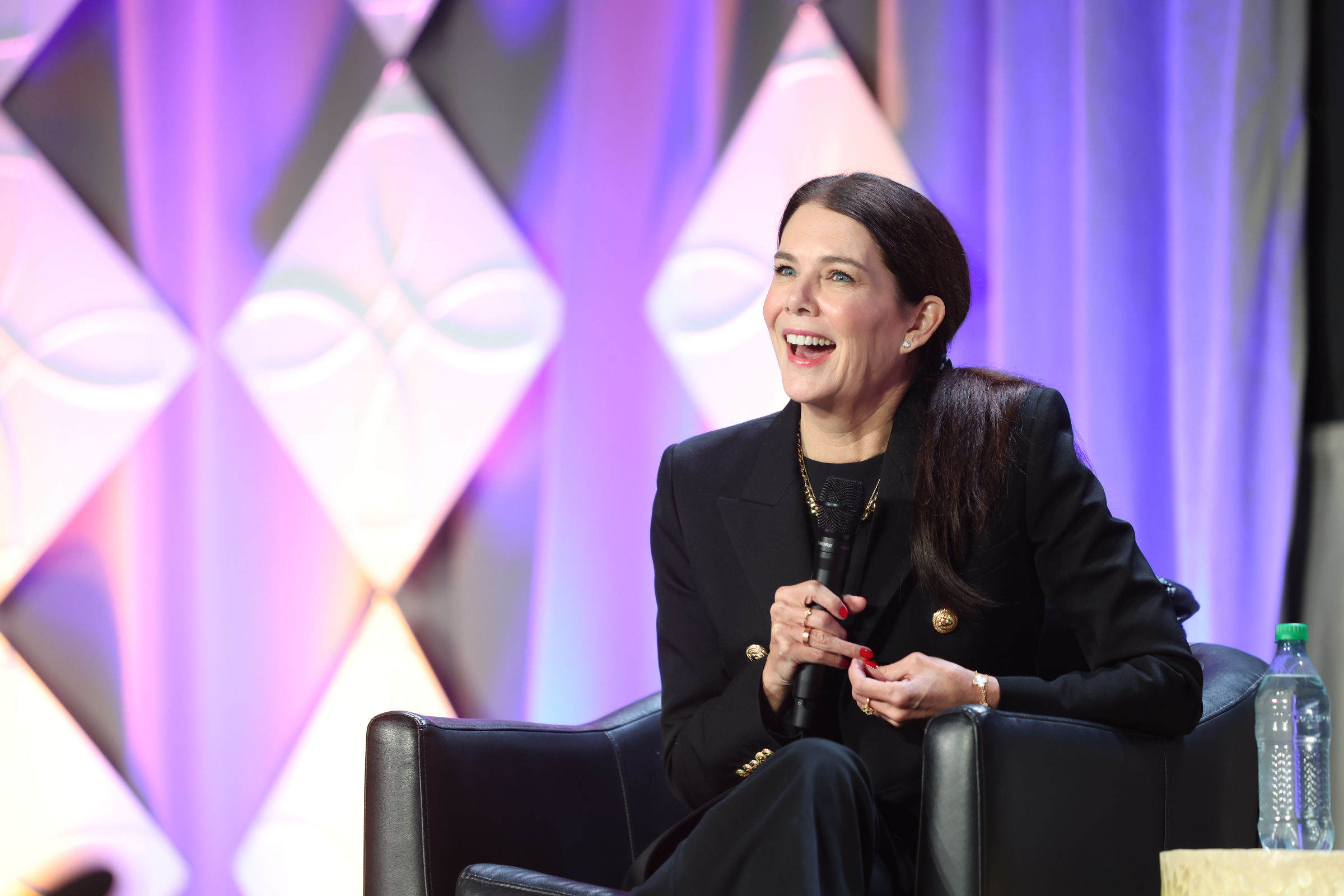ICON 2025 Recap: Storytelling, Workplace Change and Politics Take Center Stage
By Amy Jacques and John Elsasser
November-December 2025
Lauren Graham on Finding the Heart of Every Story
“At its core, a story has to be about something everybody understands — forgiveness, loss, joy, love,” said Lauren Graham, award-winning actress, producer and New York Times best-selling author.
Graham, known for portraying strong, quick-witted characters on TV shows like “Gilmore Girls” and “Parenthood,” headlined the opening General Session on Oct. 28.
In conversation with Crystal Borde, co-chair of the 2025 PRSA ICON Conference planning committee, Graham said her father’s nightly habit of reading aloud to her sparked her love of storytelling.
And Diane Keaton encouraged Graham to write her first book, after hearing her personal stories between takes on the set of the 2007 romantic comedy, “Because I Said So.” Graham’s books include the essay collections “Talking as Fast as I Can” and “Have I Told You This Already?”
The search for voice
Whether writing her own words or performing someone else’s, Graham said that finding her voice took practice and patience.
“Some of it is allowing the first draft to be terrible,” she said. “You just have to get something on the page… you’ll fix it later.”
Working with a coach reminded her that growth requires outside perspectives, and that asking for help is a strength, not a setback.
Graham shared a productivity tip that a writer friend once gave her: “You should only have two documents open on your computer — the thing you’re supposed to be working on, and a diary,” she said. “Either you’re making progress or you’re free-writing, but both keep you going.”
What makes a story resonate
The most powerful stories, Graham emphasized, tap universal emotions. Audiences connect when they see themselves in the narrative.
She told Borde — vice president and community-driven communications practice lead at Vanguard Communications — that stories resonate when they prioritize characters and relationships. Graham pointed to the enduring appeal of “Gilmore Girls,” which “lasts because of the core relationship,” she said.
Stories build connections
Graham encouraged ICON attendees to focus on the day ahead: “What’s my day going to feel like?” she said. “Am I going to laugh? Who will I be with?”
She also highlighted kindness and empathy as essential for communicators. “It’s how we connect, build trust and understand each other,” she said.
Graham closed with a reminder that storytelling isn’t just entertainment — it’s a way to build connections in a noisy world, she said. — Amy Jacques
![]()
SHRM’s Tina Beaty on the Power to Shape What’s Next
Tina Beaty, chief brand and marketing officer at SHRM, was the General Session speaker on Oct. 29. The Society for Human Resource Management serves as a voice and governing body for workplace issues, while providing resources, professional certifications and development for HR professionals.
In conversation with Ray Day, APR, 2025 PRSA chair, Beaty said layoffs are readjusting for what is coming. She cited a LinkedIn statistic that said 65% of jobs will change by 2030.
“Can the individuals be upskilled, can they be reskilled into something? It is more about the power skills — can you lead, do you have the ability to galvanize people… and find efficiencies where there [weren’t] before.”
Navigating AI and the changing workforce
“I don’t think you can fear AI,” Beaty said. “It’s here. Should you have a healthy dose of skepticism, and governance models within your organization regarding how you use it, when you use it, what you release to it and what you don’t, in terms of your [intellectual property]? Absolutely. But I don’t think fear has any place when it comes to leading through these times of change.”
Beaty said, “Communicators and HR need to work together on workforce planning in a way that we never had.” The focus should be on “what can be automated and where AI can bring immediate efficiencies.”
Talking about the skills that communicators need today, she said, “The ability to lead people is going to become even more important. Another skill is to put the human in control of the AI. It’s up to the human to understand the entirety of the business landscape, product, staff and make real-time decisions.”
Critical thinking “is going to be more important than ever before, along with flexibility and agility,” she said. “We have to be looking at strategic plans as living documents; we need to be taking in data as it comes in real time and pivoting.”
Beaty closed by urging the audience to stay flexible and focused amid constant transformation.
“We need to be making decisions in real time and bringing our teams along on the journey.” The future of work, she said, isn’t on the horizon — “it’s being defined now, by communicators and leaders who connect people to purpose through clarity, empathy and courage.” — A.J.
Politics Are Rewriting Communication Rules
The closing General Session on Oct. 30 brought together journalists, strategists and advisers for a conversation on how politics are reshaping communications. Moderated by Ray Day, APR, 2025 PRSA chair, the session featured:
- Brendan Buck, former counselor to House Speaker Paul Ryan and press secretary to House Speaker John Boehner, now a partner at communications agency Seven Letter and an MSNBC political analyst
- Leigh Ann Caldwell, chief Washington correspondent for Puck.news and former correspondent for The Washington Post and NBC News
- Zac Moffatt, CEO of public-affairs agency Targeted Victory and former digital director for the Romney for President campaign
- Robyn Patterson, former assistant White House press secretary for President Biden
- Ali Vitali, MSNBC anchor and Capitol Hill correspondent
The panelists agreed that recent presidential campaigns have been incubators for communications innovation — fast-moving environments where new technologies and storytelling tactics are tested before they reach corporate communications.
Over-scripting and the risks of playing it safe
“People don’t believe perfectly scripted messages anymore,” Moffatt said.
Patterson agreed that authenticity resonates, even when it carries risk. “People don’t have to like everything about a leader,” she said. “They just want to believe they’re seeing who that person really is.”
Redefining earned and influencer media
Caldwell emphasized that traditional and emerging media serve distinct but complementary roles. “To reach decision-makers, go to outlets like Puck,” she said. “To reach the masses, use national or local platforms.”
Patterson said the White House pairs traditional coverage with influencers and local voices — “from The Wall Street Journal to TikTok” — to reach multiple audiences.
Creating a new playbook for communicators
The line between political and corporate storytelling has blurred, Vitali said. “Whether you’re covering a campaign or leading a company, people expect transparency and consistency.”
Buck said communicators should focus less on controlling every narrative and more on showing up in meaningful ways. “You can’t plan every headline,” he said. “But you can decide to participate — and that’s what earns credibility.”
The panelists returned to one truth: Relationships drive everything — whether you’re running a campaign, briefing a reporter or managing a corporate narrative.
“Politics teaches you to meet people where they are,” Caldwell said. “But relationships and trust are what keep them listening.”
Said Vitali, “There’s a new craving for authenticity, from candidates and from reporters.” — John Elsasser




